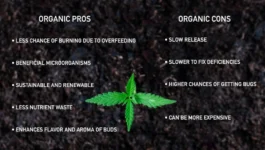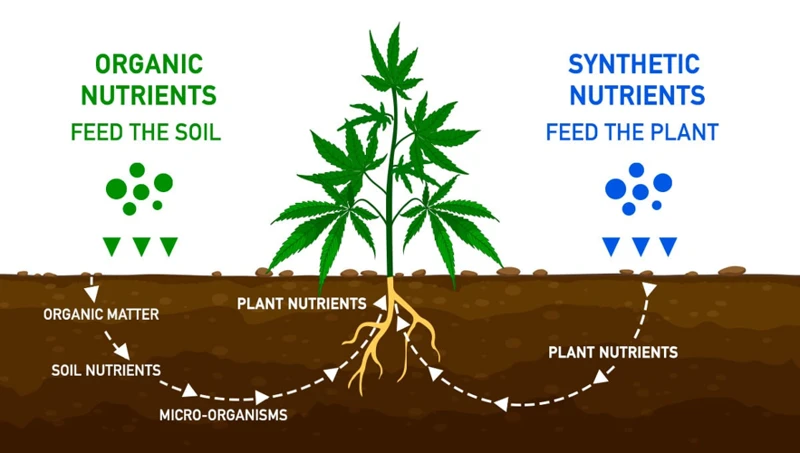
Organic vs Synthetic Nutrients for Growing Hydroponic Cannabis
When it comes to growing hydroponic cannabis, one of the key decisions a cultivator has to make is choosing the right nutrients. There are so many different options available, each promising to help their plants thrive. Two of the most popular choices are organic and synthetic nutrients. While both have their advantages and disadvantages, it can be difficult to decide which one to use. In this article, we will explore the differences between organic and synthetic nutrients, weigh their pros and cons, and provide you with the information you need to make an informed decision that suits your grow style and goals.
What Are Organic Nutrients?
Contents
When it comes to hydroponic cannabis cultivation, nutrients play a crucial role in determining the quality and quantity of your yields. Organic nutrients are one option that growers often turn to, but what exactly are they? Let’s delve into the world of organic nutrients and explore their benefits and drawbacks.
Pros of Organic Nutrients
Organic nutrients are derived from natural sources and come with a host of benefits that make them a popular choice among cannabis growers. Some of the main pros of organic nutrients include:
- Sustainable: Organic nutrients are a sustainable choice for growers as they are derived from natural sources and are renewable. This makes them an eco-friendly option that can help reduce your carbon footprint during the cultivation process.
- Improved soil health: Organic nutrients can improve soil health by promoting microbial activity and increasing nutrient retention. This can lead to more efficient nutrient uptake by the plants, resulting in improved growth and yield.
- Better taste and aroma: Cannabis plants grown with organic nutrients tend to have a better taste and aroma as compared to synthetic nutrients. This is because of the presence of natural micronutrients and minerals that can enhance the flavor profile of the final product.
- Improved terpene profiles: Terpenes are organic compounds that are responsible for the aroma and flavor of cannabis plants. Organic nutrients can help improve the terpene profiles of your cannabis plants, leading to more complex and desirable flavors and aromas.
- Less risk of nutrient burn: Organic nutrients are typically milder than their synthetic counterparts and are less likely to cause nutrient burn. This can help reduce the risk of damaging your plants during the cultivation process.
- Safe for consumption: Cannabis plants grown with organic nutrients are considered to be safe for consumption as they do not contain any harmful chemicals or additives.
Organic nutrients are a great choice for cannabis growers who want to produce high-quality, sustainable, and safe products that have a unique flavor and aroma profile. While they may not be as convenient or readily available as synthetic nutrients, their long-term benefits make them a worthy investment for any serious grower.
Cons of Organic Nutrients
While organic nutrients have their benefits, they also have some drawbacks that should be taken into account when deciding on the best nutrient option for your hydroponic cannabis. Some of the cons of using organic nutrients are:
| Cons of Organic Nutrients | |
|---|---|
| Slow Release: | Organic nutrients are typically slow to release compared to synthetic options, meaning they may not meet the nutritional needs of the cannabis plant in a timely manner. |
| Inconsistent: | Since organic nutrients are derived from natural sources, the composition of the nutrients can vary from batch to batch, making it difficult to ensure consistency in your hydroponic system. |
| Bulkier: | Organic nutrients tend to be bulkier and heavier compared to synthetic nutrients, which can be problematic for hydroponic growers who are looking to optimize their use of space. |
| May Attract Pests: | The organic nature of these nutrients can attract pests such as fungus gnats or mites which can harm your cannabis plants. |
| Can Be Expensive: | Organic nutrients are often more expensive than synthetic options, which can be a significant cost factor for some growers. |
While some of these cons may seem like a deal breaker, it’s important to keep in mind that organic nutrients have been used successfully for many years and can be a great option for those who prioritize natural and sustainable growing practices. Ultimately, the decision of whether to use organic or synthetic nutrients will depend on your individual preferences and needs as a grower.
What Are Synthetic Nutrients?
When it comes to hydroponic cannabis cultivation, synthetic nutrients are a popular choice among growers. Unlike organic nutrients, synthetic nutrients are artificially created in laboratories and typically come as a pre-made solution. While some growers swear by synthetic nutrients, others have concerns about their impact on plant health and the environment. Let’s take a closer look at what synthetic nutrients are and explore their pros and cons.
Pros of Synthetic Nutrients
One of the advantages of using synthetic nutrients in hydroponic cannabis cultivation is their ability to provide the plants with all the nutrients they need in an easily accessible form. This can lead to faster growth and larger yields compared to organic nutrients, which often require microbial activity to break down complex compounds into usable forms.
Synthetic nutrients are also consistent in their nutrient content, meaning you can accurately measure and adjust the amount of each nutrient and create a tailored feeding routine. This can be especially beneficial for commercial growers who need to produce consistent yields to meet market demands.
Another benefit of synthetic nutrients is their affordability. As synthetic nutrients are often manufactured on a larger scale, they can be sold at a lower cost compared to organic nutrients, which are typically made from natural sources that are more expensive to produce.
Finally, synthetic nutrients are easier to store and transport than organic nutrients. They have a longer shelf life and do not require refrigeration, making them a more convenient option for growers who may need to store a large amount of plant food for an extended period.
The use of synthetic nutrients in hydroponic cannabis cultivation has several advantages, including providing plants with easily accessible nutrients, being consistent in nutrient content, being affordable, and being easier to store and transport compared to organic nutrients.
Cons of Synthetic Nutrients
While synthetic nutrients have their benefits, it’s important to consider their downsides as well. Here are some of the main cons of using synthetic nutrients in hydroponic cannabis growth:
- Chemical-based: Synthetic nutrients are derived from chemicals, which can potentially harm the environment and the plants themselves by leaving behind traces of unwanted chemicals.
- Overfeeding and buildup: It’s easy to overfeed your plants with synthetic nutrients because they are concentrated and fast-acting. This can lead to an excessive buildup of nutrients, which can damage the plants and affect their growth.
- Imbalanced nutrient ratios: Synthetic nutrients are often only available in pure forms, which can lead to an imbalance of nutrient ratios. This means that certain nutrients may be overrepresented, while others may be lacking, leading to nutrient deficiencies or toxicities.
- Expensive: Synthetic nutrients can be more expensive than organic ones because of the proprietary processes used to create them.
- Environmental impact: The production of synthetic nutrients requires energy and resources, which can negatively impact the environment.
While these downsides may not be deal-breakers for everyone, it’s important to weigh the pros and cons of synthetic nutrients before deciding to use them in your hydroponic cannabis grow.
Which One Should You Choose?
Now that we have explored the pros and cons of both organic and synthetic nutrients, you may still be left wondering which one is the better choice for your hydroponic cannabis grow. There is no easy answer to this question, as each type of nutrient has its own advantages and disadvantages. However, by examining certain factors and matching the nutrient to your specific grow style, you can make an informed decision on which one to choose. Let’s dive deeper into the decision-making process.
Factors to Consider
When deciding which type of nutrients to use for your hydroponic cannabis grow system, there are several factors you should consider. Here are the key factors to keep in mind:
- Growing Experience: If you are new to hydroponic growing, it may be worth starting with organic nutrients. They generally require less precision and have a more forgiving margin of error.
- Budget: Synthetic nutrients can be more expensive upfront, but they often require less frequent applications and can lead to a higher yield, which can ultimately save you money in the long run.
- Desired Taste and Smell: Organic nutrients are often praised for the flavor and aroma that they can produce in the plants. If taste and smell are a priority for you, you may want to consider using organic nutrients.
- Environmental Impact: Organic nutrients are more eco-friendly, as they are made from natural sources and are biodegradable. Synthetic nutrients can be harsher on the environment and may contain chemicals that can be harmful in large quantities.
- Time and Effort: If you are looking for an easier, low-maintenance option, synthetic nutrients may be a better choice. They often require less time and effort to prepare and administer than organic nutrients.
Ultimately, the decision between organic and synthetic nutrients for your hydroponic cannabis grow system will depend on your individual needs and preferences. Consider the pros and cons of each type of nutrient and how they align with your budget, goals, and values before making a choice.
Match the Nutrient to Your Grow Style
The importance of choosing the right nutrient for your hydroponic cannabis setup cannot be stressed enough. To maximize yields and produce high-quality buds, it is crucial to match the nutrient to your grow style.
There are a handful of factors to consider when choosing between organic or synthetic nutrients, including the grow medium, pH levels, and plant stage. Additionally, there are different nutrient formulations available, each designed to suit a specific grow style. Here are a few examples:
| Nutrient | Grow Style | Plant Stage | Benefits |
|---|---|---|---|
| General Hydroponics Flora Series | Hydroponic | Vegetative | Complete nutrient system with three components; ideal for plants in the vegetative stage. |
| Fox Farms Big Bloom | Organic | Blooming | Contains earthworm castings and bat guano; promotes healthy flowering and fruiting. |
| Advanced Nutrients Overdrive | Synthetic | Mid-to-late Flowering | Contains phosphorus and potassium; stimulates floral growth and increases yield. |
| Botanicare Kind Grow | Organic | Seedling to Vegetative | Derived from fish and seaweed; promotes vigorous growth and helps establish healthy roots. |
As you can see, choosing the right nutrient for your grow style and plant stage can have a big impact on the health and productivity of your hydroponic cannabis garden. Be sure to do your research and consult with experienced growers to determine the best nutrient plan for your particular setup.
Conclusion
In conclusion, both organic and synthetic nutrients can be used successfully for hydroponic cannabis cultivation. It ultimately comes down to personal preference and the specific needs of the grower’s plants.
Organic nutrients offer a more natural approach to growing cannabis and can lead to healthier soil and increased biodiversity. They also tend to be more sustainable and environmentally friendly. However, organic nutrients can be inconsistent in their nutrient content and may require more maintenance and experience to use effectively.
Synthetic nutrients, on the other hand, provide precise and consistent nutrient ratios that can lead to larger yields and faster growth. They are generally easier to use and require less maintenance, but they may not provide the same level of soil health and environmental benefits that organic nutrients can.
When deciding which type of nutrient to use, it’s important to consider factors such as the grower’s experience level, environmental impact, and the specific needs of the plants. Matching the nutrient to the grow style is also important, as some hydroponic systems may be better suited for one type of nutrient over the other.
Overall, the decision to use organic or synthetic nutrients for hydroponic cannabis cultivation is a personal one that should be based on careful consideration and research. No matter which option is chosen, proper nutrient management and attention to plant growth will be key to a successful harvest.
Frequently Asked Questions
What nutrients are needed for hydroponic cannabis growth?
Hydroponic cannabis requires a combination of macronutrients such as nitrogen, phosphorus, and potassium, as well as micronutrients like sulfur, calcium, and iron.
What is the difference between organic and synthetic nutrients?
Organic nutrients come from natural sources like compost and manure, while synthetic nutrients are chemically manufactured.
What are the pros of using organic nutrients?
Organic nutrients are typically more environmentally friendly, can improve soil health, and may produce better tasting produce.
What are the cons of using organic nutrients?
Organic nutrients may be less precise in their nutrient content, can be more expensive, and may contain harmful bacteria or pathogens if not properly processed.
What are the pros of using synthetic nutrients?
Synthetic nutrients can be more precise in their nutrient content, are typically less expensive, and can produce faster growth rates.
What are the cons of using synthetic nutrients?
Synthetic nutrients can potentially harm the environment if not properly disposed of, can lead to nutrient lockout if not properly balanced, and may produce less flavorful produce.
How do I choose between organic and synthetic nutrients?
Consider your budget, grow style, and environmental impact when choosing between organic and synthetic nutrients.
Can I use a combination of organic and synthetic nutrients?
Yes, it is possible to use a combination of organic and synthetic nutrients. This is known as a hybrid approach.
What is nutrient lockout?
Nutrient lockout occurs when the pH of the growing medium is outside of the optimal range, preventing the plant from absorbing certain nutrients.
How do I prevent nutrient lockout?
Maintain a proper pH range of 5.5-6.5 for hydroponic cannabis growth and avoid over-fertilizing.




